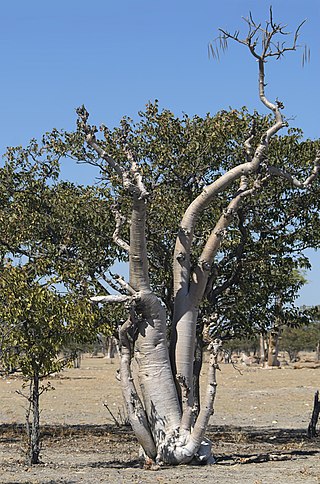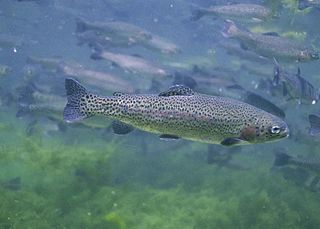
China, officially the People's Republic of China (PRC), is a country in East Asia. With a population exceeding 1.4 billion, it is the world's second-most-populous country. China spans the equivalent of five time zones and borders fourteen countries by land. With an area of nearly 9.6 million square kilometers (3,700,000 sq mi), it is the third-largest country by total land area. The country is divided into 22 provinces, five autonomous regions, four municipalities, and two semi-autonomous special administrative regions. Beijing is the national capital, while Shanghai is the most populous city and largest financial center.
Genus is a taxonomic rank used in the biological classification of living and fossil organisms as well as viruses. In the hierarchy of biological classification, genus comes above species and below family. In binomial nomenclature, the genus name forms the first part of the binomial species name for each species within the genus.

Sharks are a group of elasmobranch fish characterized by a cartilaginous skeleton, five to seven gill slits on the sides of the head, and pectoral fins that are not fused to the head. Modern sharks are classified within the clade Selachimorpha and are the sister group to the Batoidea. Some sources extend the term "shark" as an informal category including extinct members of Chondrichthyes with a shark-like morphology, such as hybodonts. Shark-like chondrichthyans such as Cladoselache and Doliodus first appeared in the Devonian Period, though some fossilized chondrichthyan-like scales are as old as the Late Ordovician. The oldest confirmed modern sharks (selachimorphs) are known from the Early Jurassic, about 200 million years ago, though records of true sharks may extend back as far as the Permian.

An apricot is a fruit, or the tree that bears the fruit, of several species in the genus Prunus.

Lilium is a genus of herbaceous flowering plants growing from bulbs, all with large prominent flowers. They are the true lilies. Lilies are a group of flowering plants which are important in culture and literature in much of the world. Most species are native to the Northern Hemisphere and their range is temperate climates and extends into the subtropics. Many other plants have "lily" in their common names, but do not belong to the same genus and are therefore not true lilies.

Scallions are edible vegetables of various species in the genus Allium. Scallions generally have a milder taste than most onions. Their close relatives include garlic, shallots, leeks, chives, and Chinese onions.

An argus, or argus pheasant, is a member of a clade in the tribe Pavonini of the family Phasianidae, containing two species of bird that are closely related to peafowl.

Moringa is the sole genus in the plant family Moringaceae. It contains 13 species, which occur in tropical and subtropical regions of Africa and Asia and that range in size from tiny herbs to massive trees. Moringa species grow quickly in many types of environments.

The rainbow trout is a species of trout native to cold-water tributaries of the Pacific Ocean in Asia and North America. The steelhead is an anadromous (sea-run) form of the coastal rainbow trout(O. m. irideus) or Columbia River redband trout (O. m. gairdneri) that usually returns to freshwater to spawn after living two to three years in the ocean. Freshwater forms that have been introduced into the Great Lakes and migrate into tributaries to spawn are also called steelhead.

A flower, also known as a bloom or blossom, is the reproductive structure found in flowering plants. Flowers consist of a combination of vegetative organs – sepals that enclose and protect the developing flower, petals that attract pollinators, and reproductive organs that produce gametophytes, which in flowering plants produce gametes. The male gametophytes, which produce sperm, are enclosed within pollen grains produced in the anthers. The female gametophytes are contained within the ovules produced in the carpels.

The Balanidae comprise a family of barnacles of the order Balanomorpha. As a result of research published in 2021 by Chan et al., the members of the family Archaeobalanidae were merged with this family.
There are a number of environmental issues in Florida. A large portion of Florida is a biologically diverse ecosystem, with large wetlands in the Everglades. Management of environmental issues related to the everglades and the larger coastal waters and wetlands have been important to the history of Florida and the development of multiple parts of the economy of Florida, including the influential agricultural industry. This biodiversity leaves much of Florida's ecological ecosystem vulnerable to invasive species and human sources of industrial pollution and waste.
Zawistowszczyzna is a village in the administrative district of Gmina Sokółka, within Sokółka County, Podlaskie Voivodeship, in north-eastern Poland, close to the border with Belarus. It lies approximately 3 kilometres (2 mi) south-west of Sokółka and 36 km (22 mi) north-east of the regional capital Białystok.
Fritz Hamer was an outstanding German botanist who worked in Central America, specializing in orchids.
Animal Ethics is a nonprofit organization formed to promote discussion and debate around issues in animal ethics and to provide information and resources for animal advocates. They also do outreach work in several countries on the issue of speciesism. Their aim is to create a world where moral consideration is extended to all sentient beings. The organization's website covers topics such as speciesism, sentience, veganism and wild animal suffering and has content translated into several languages.

Chirona is a genus of acorn barnacles in the family Balanidae. There are about six described species in Chirona.











